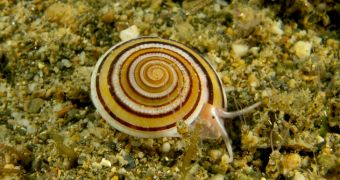According to a new study carried out by environmental scientists and marine biologists in the Southern Ocean, the ever-increasing levels of carbon emissions that get absorbed by our planetary waters are causing some animal species to dissolve.
More precisely, the researchers who looked into this issue have found that, as a result of ocean acidification, the shells of marine snails are becoming more fragile.
As one can easily imagine, this leaves these marine creatures more vulnerable to whatever threats they might be exposed to, and could very easily lead to a significant drop in the overall headcount for the species.
Since marine snails are part and parcel of the daily diet of several other animal species, it need not come as a surprise that their becoming harder to come by will ultimately impact on marine wildlife in general, Inhabitat explains.
“The tiny snails do not necessarily die as a result of their shells dissolving, however it may increase their vulnerability to predation and infection consequently having an impact to other parts of the food web,” Dr. Geraint Tarling said.

 14 DAY TRIAL //
14 DAY TRIAL //